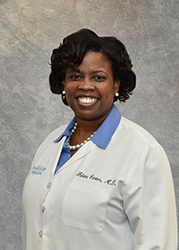Summer is a great time to be active and get outside, especially if you have kids. But between the heat and increased UV radiation, summer also comes with increased health risks. Whether you’re heading outdoors for fun or fitness, it’s important to make sure your summer habits are helping–not hurting–your health.
Unfortunately, the last few years have seen an uptick in misinformation and myths related to summer safety. Read on as we bust some summer safety myths and share the tips to keep you and your family having fun outside all summer long!
Myth #1: Sunscreen isn’t safe to use (or, only mineral sunscreens are safe)
The Truth: Both chemical and mineral sunscreens are considered safe and effective by dermatologists and the U.S. Food and Drug Administration (FDA). The most important thing is that your sunscreen offers broad-spectrum protection and an SPF of at least 30, especially for people with lighter skin.
That doesn’t mean you can’t have a preference between chemical and mineral sunscreens! Some people who prefer mineral sunscreens are often recommended due to sensitive skin, but others prefer chemical sunscreens since they tend to apply more smoothly and usually leave less of a white cast. As the American Academy of Dermatology says, the best sunscreen is the one you’ll wear every single day.
Myth #2: You only need sunscreen on sunny days
The Truth: UV rays can cause skin damage even if it’s cloudy, or when you’re indoors near a window. UVA rays, which contribute to early aging and skin cancer, can pass through clouds and glass. That’s why dermatologists and the FDA recommend wearing sunscreen everyday, regardless of the weather. As the AAD notes, “Daily use of an SPF 15 or higher sunscreen reduces the risk of developing melanoma by 50%”.
You also want to make sure that you’re wearing enough sunscreen. Many people only apply 20-50% of the amount of sunscreen necessary to protect against damage. Choosing a higher SPF sunscreen can help compensate for this under-application, but correct use still matters. Apply about 1 ounce (a shot glass full) for your entire body, and reapply every two hours when outdoors, even on cloudy days, and after swimming or sweating. If you are just looking to protect your face and neck, apply approximately ½ tsp of sunscreen.
When it comes to kids and infants, be sure to take extra care: children’s skin is especially sensitive to UV damage, and sunscreen shouldn’t be used on babies under 6 months old. The FDA recommends keeping infants in the shade and dressed in lightweight clothing rather than applying sunscreen.
Myth #3: It’s not safe to exercise in hot weather.
The Truth: Outdoor activity can still be safe as long as you take the right precautions. The CDC recommends avoiding peak heat hours (10 am to 4 pm), drinking plenty of water, and wearing lightweight, breathable clothing.
Heat exhaustion and heat stroke are serious risks, especially for older adults or people with medical conditions. It’s important to be aware of the warning signs like dizziness, confusion, muscle cramping or nausea during or after exercise in the heat–these symptoms should never be ignored. Planning your workouts for cooler times of the day and staying consistently hydrated can help you stay active without putting your health at risk.
Myth #4: It’s best to drink a sports drink or electrolytes when exercising outside.
The Truth: When it comes to how you hydrate, it depends how long and how intensely you’re exercising. Northwestern Medicine advises that water is typically enough for moderate workouts and exercise lasting under an hour.
Sports drinks can help replenish the electrolytes lost through sweat, but many contain added sugars and high levels of sodium that aren’t necessary for the average person. If you’re planning to do a high intensity, long workout–especially in the heat–electrolyte replacements or sports drinks might be helpful, but make sure to read labels closely and choose based on your specific needs.
Stay Healthy All Summer Long
Summer is meant to be enjoyed–but as we’ve seen, common myths around sun safety, hydration, and heat can get in the way of smart decisions. Whether you’re spending more time outdoors, exercising more, or just trying to stay cool, a few informed choices can help you avoid preventable risks.
If you have questions about sun protection, hydration, or exercising safely, ask your MPCP physician. No matter the season, they’re here to support your health.







